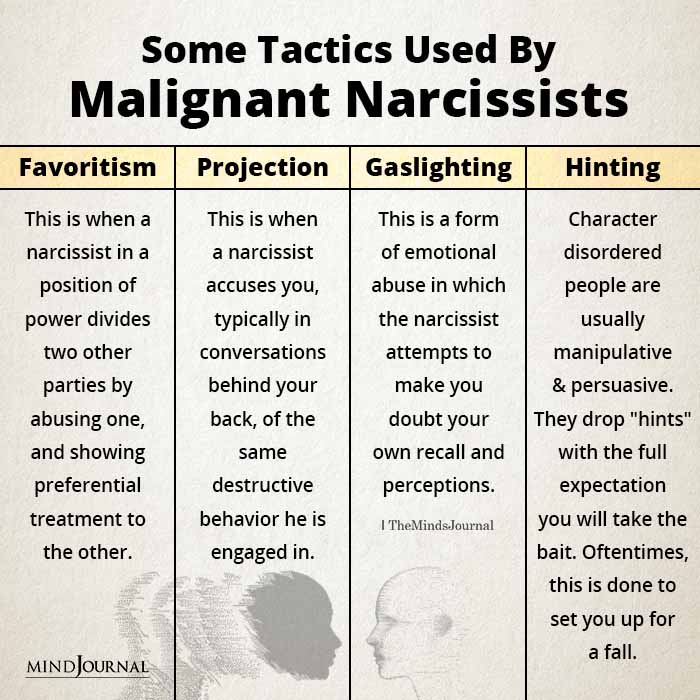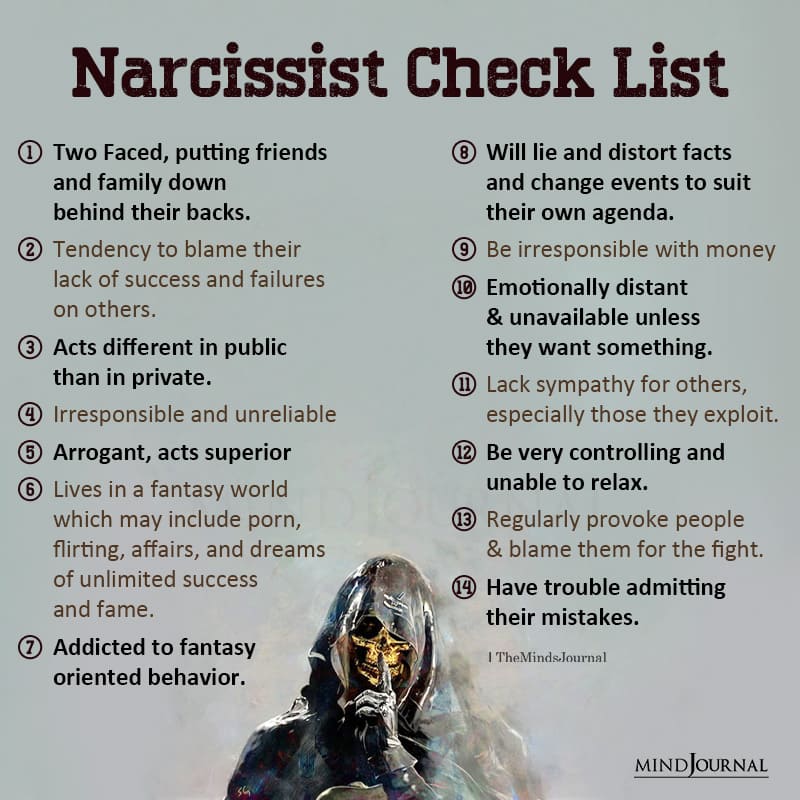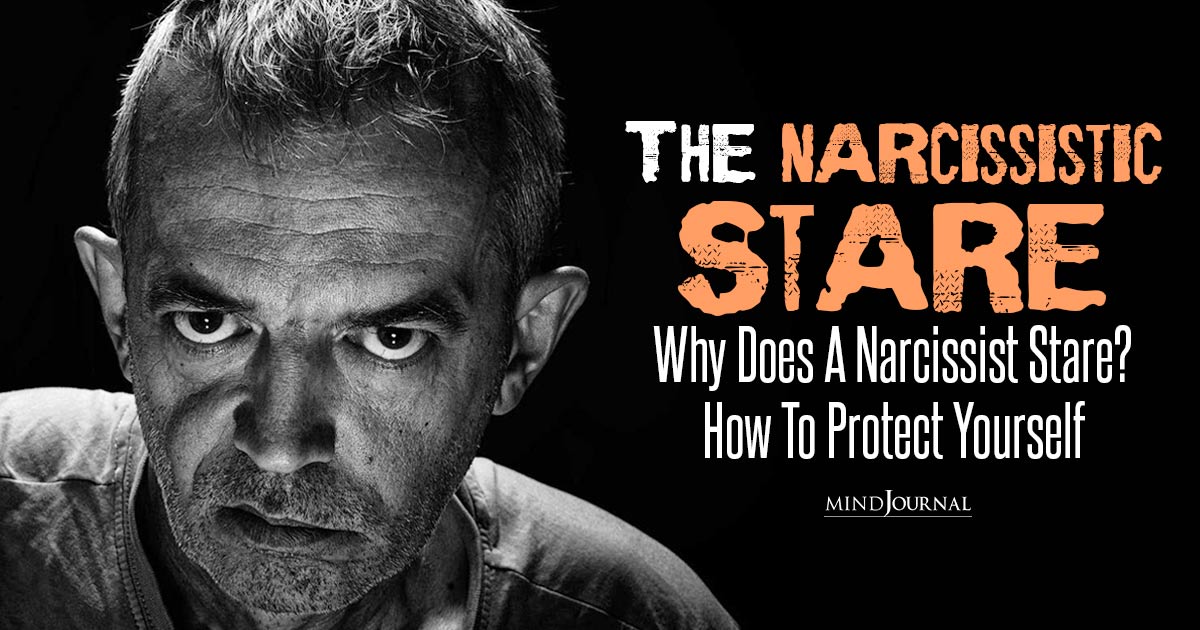The human gaze holds immense power, capable of expressing emotions, desires, and even hidden intentions. Among the many intriguing forms of eye contact, the narcissistic stare stands out as an enigmatic phenomenon that both fascinates and perplexes.
But what is the narcissistic stare? Well, have you ever encountered someone whose gaze seemed to penetrate your very soul, leaving you feeling exposed and uncomfortable?
Let us delve into this fascinating concept, exploring what is the narcissistic stare, why do narcissists stare and the different variations it takes on, including the malignant narcissist stare and the female narcissistic stare.
What is the Narcissistic Stare?
The narcissistic stare refers to a distinct, intense gaze often exhibited by individuals with narcissistic personality traits or Narcissistic Personality Disorder (NPD). It is characterized by an unwavering, piercing focus that can leave others feeling unsettled and vulnerable.
It is marked by a lack of empathy, a focus on dominance, and a sense of superiority. It can be an attempt to control, intimidate, or convey a sense of entitlement.
The intensity of the gaze may make those on the receiving end feel uneasy or manipulated. This gaze is not merely a fleeting glance but a prolonged and deliberate act that serves several underlying purposes.
This non-verbal behavior is typically devoid of genuine warmth or connection. Instead, it may convey a desire for control. The narcissistic stare is one of the many subtle yet impactful ways in which individuals with narcissistic tendencies assert power and manipulate social dynamics.
Related: Psychopathic Stare & 6 More Non-Verbal Cues Of A Psychopath

Why Do Narcissists Stare?
Typically, narcissists stare to exert control, intimidate, and display dominance. The intense gaze is a tool for manipulation, reflecting their need for power and admiration.
Here are some probable reasons explaining why do narcissists stare –
1. The Need for Control and Dominance
Narcissists employ the power of their gaze as a means to establish control and dominance over others. By fixating their gaze upon their target, they seek to intimidate, manipulate, and assert their superiority.
This prolonged eye contact is a tool they use to exert power and instill a sense of submission in their victims.
2. Seeking Narcissistic Supply
Narcissists crave validation and attention from others, known as narcissistic supply. The intense stare serves as a means to draw people in, captivate their attention, and elicit the desired response.
They feed off the emotional reactions they provoke, gaining a sense of power and self-importance in the process.
3. Mirroring Their Idealized Self-image
Narcissists often harbor grandiose delusions and an inflated sense of self. Through their intense gaze, they seek confirmation and affirmation of their idealized self-image.
By holding eye contact, they attempt to project an aura of confidence, superiority, and desirability to others.
Related: How To Explain The Effect of Narcissistic Abuse On Me?
Understanding The Malignant Narcissist Stare
Malignant narcissism represents an extreme form of narcissistic personality disorder, encompassing traits of narcissism, sadism, and antisocial behavior. The malignant narcissist stare is an intensified version of the typical narcissistic gaze, reflecting the malevolence and cruelty of these individuals.
In the context of malignant narcissism, the stare is used as a manipulative tactic to instill fear, control, and submission in their victims. It is often accompanied by a cold, calculating expression, devoid of empathy or compassion. The purpose is to exploit and dominate others for personal gain.
The Female Narcissistic Stare
While narcissism can manifest in individuals of any gender, female narcissists may exhibit certain distinct behaviors. The female narcissistic stare is characterized by different nuances, reflecting the gender-specific social dynamics and expectations.
Female narcissists often leverage their gaze to charm and manipulate others, particularly in the context of romantic relationships. Their intense eye contact can be seductive, drawing others in while concealing their true intentions.
The female narcissistic stare is a potent tool that allows them to exert control, exploit vulnerabilities, and fulfill their self-serving desires.

How to Deal with Narcissistic Stare
Dealing with the intense gaze of a narcissist can be challenging and unsettling. However, there are strategies you can employ to protect yourself and maintain your emotional well-being.
Here are some tips on how to deal with a narcissistic stare:
1. Maintain Boundaries
Establish and enforce clear boundaries in your interactions with the narcissist. Understand and communicate your limits, both in terms of time spent together and the topics of discussion.
By setting boundaries, you assert your autonomy and prevent the narcissist from encroaching upon your emotional space.
2. Practice Emotional Detachment
Recognize that the narcissistic stare is a calculated tactic aimed at eliciting a reaction from you. Try to detach yourself emotionally from their gaze and remain composed.
By not allowing their intense gaze to affect you, you retain your personal power and minimize their ability to manipulate your emotions.
Related: 12 Weird Things Narcissists Do
3. Limit Contact
Whenever possible, reduce your exposure to the narcissist. Minimize interactions and create distance between yourself and the individual displaying narcissistic behaviors.
This can help protect your mental and emotional well-being and provide you with a sense of relief from their intense gaze.
4. Seek Support
Reach out to trusted friends, family members, or support groups who can understand and validate your experiences.
Sharing your concerns and feelings with others can provide you with perspective and support. It is essential to surround yourself with individuals who uplift and empower you.
5. Maintain Self-Confidence
Narcissists often target individuals with low self-esteem, exploiting their vulnerabilities. Build and nurture your self-confidence by engaging in activities that bring you joy and fulfillment.
Focus on your strengths and accomplishments, reaffirming your self-worth. The stronger your self-esteem, the less impact the narcissistic stare will have on you.
Remember, dealing with a narcissist can be challenging, and it is crucial to prioritize your well-being. Focus on cultivating healthy relationships, setting boundaries, and maintaining your self-confidence.
By taking care of yourself and recognizing the manipulative tactics of narcissists, you can navigate these encounters with resilience and protect your emotional health.

Takeaway
The narcissistic stare, with its captivating intensity, reveals the complex and manipulative nature of individuals with narcissistic traits. By understanding the underlying motives behind this gaze, we can empower ourselves to recognize and protect against its influence.
Whether it is the need for control, the pursuit of narcissistic supply, the malevolent intentions of malignant narcissists, or the alluring yet deceitful gaze of female narcissists, the narcissistic stare serves as a reminder to be vigilant and assertive in maintaining healthy boundaries.
By honing our awareness, we can navigate these encounters with resilience and safeguard our well-being.
Related: 8 Mental Abuse Tactics To Watch Out For
Frequently Asked Questions (FAQs):
Can you see narcissism in the eyes?
While not definitive, the intense and piercing gaze, known as the narcissistic stare, can be a non-verbal indicator of narcissistic traits.
Can you tell a narcissist by appearance?
Narcissism isn’t solely determined by appearance, but certain traits like excessive self-focus and lack of empathy may manifest behaviorally.
What turns a narcissist off?
Narcissists may be turned off by criticism, rejection, lack of admiration, and challenges to their perceived superiority or grandiosity.









Leave a Reply
You must be logged in to post a comment.